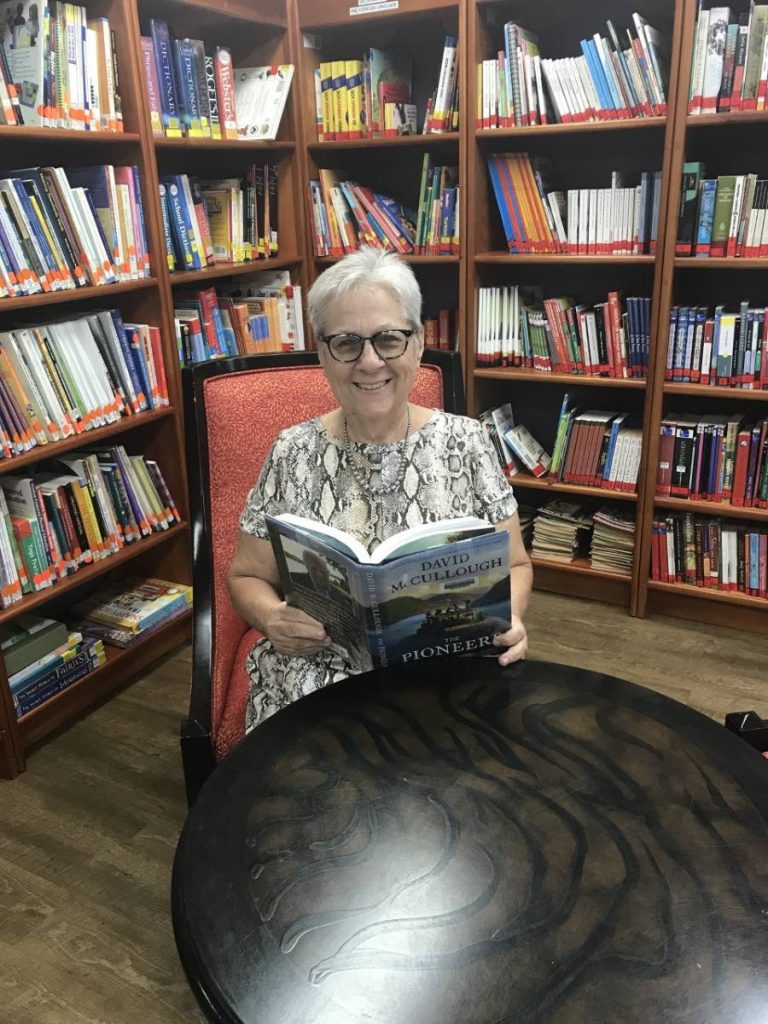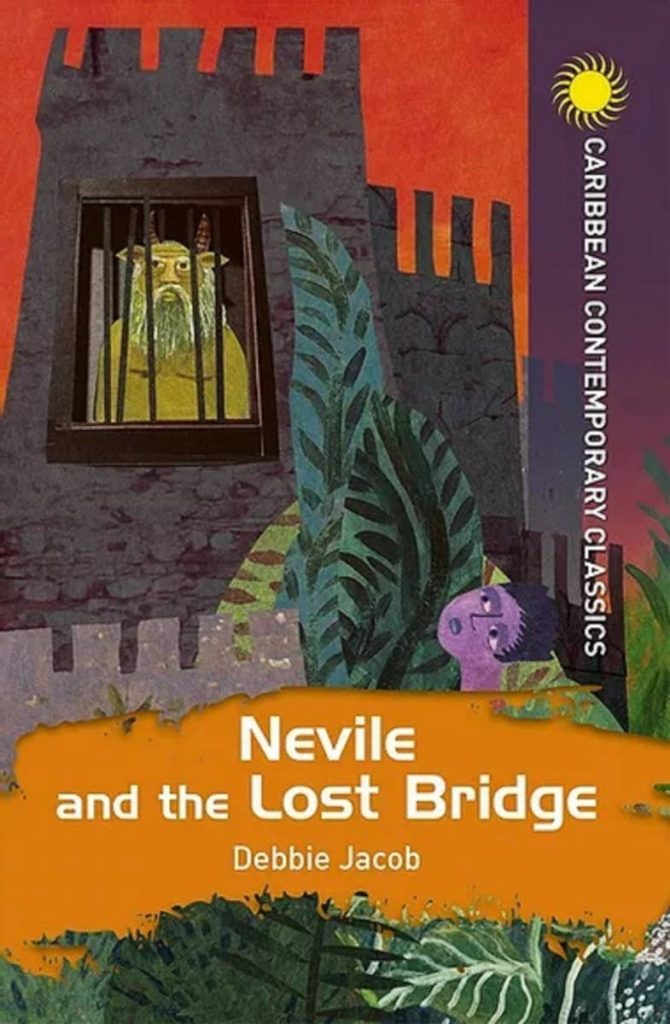Debbie Jacob begins children's trilogy

Author and Newsday columnist Debbie Jacob’s new children’s book, Nevile and The Lost Bridge, is the first of a trilogy she is writing for Hodder Educational Books.
Jacob said if the response is good, she hopes to develop it into a series.
The book is set in the Caribbean in 2222, in a world where children work and adults go to school.
The synopsis says, “Nevile and his friends Nina and AT are elite bridge-builders in the province of Aribbea, where children go to work, adults go to school, and everyone is ruled by a tyrannical king. No one remembers what life was like before the calamitous event which brought the king to power and enabled him to lock up all secrets and memory in his own library. Aribbeans now have no memory, and no understanding of the world outside the bridges on which they live.
“When Nevile, Nina and A T find themselves plunging from a bridge to the land and sea below, they have no idea what will befall them. Sometimes together, sometimes apart, each must make his or her way through the tests and challenges which await them, to find their true place and to begin to recover their history.
"Accompanied by a varied cast of companions, they encounter Pierre the Bacoo, Papa Bois, the rasta Hunn Dread, Hanuman the monkey and the last dog in Arribea. This motley crew succeeds in posing the first real challenge to his rule which the king has ever faced.”
Jacob said Nevile is deliberately spelt that way, as it plays into the plot.
She said some of the questions she wanted to ask in the book were: “What do friendship and loyalty mean? How do we know when we are safe, and what makes us so? Who can we trust?”
She said the themes explored in the book were based on her work as an educator, librarian, journalist, and prison reform activist.
“Children are not being taught the concepts of leadership, power, and abuse of power. Those concepts define us as a society.
"Kids aren’t being taught to ask questions. They are the powerless and voiceless in a society that isn’t producing a new generation of leaders.
"When I was teaching, I used to say education was wasted on the young, so maybe the adults should go to school and the children should work.”
She said in the book’s world, the protagonists don’t know that people live on land, so when Nina goes missing, and the boys have to go look for her, it’s a whole new world for them.
“Nevile is well-known as a bridge-builder, but when he’s taken out of his element, he has to think on his feet. He’s destined to be a leader, but he doesn’t know how to define that when he’s out of his element. The book explores topics like what is leadership, what is power and abuse of power, and how do we know our purpose in life?”
Jacobs said she hoped these important questions are answered in a fun, fast-moving story.
“I found when I was working as a librarian that children love good literature when it’s presented to them. They would come for fluff – but would like good stuff if I read it to them. I wanted children to have the same elements we look forward to in a good story.

"I’ve incorporated elements from some of my favourite writers as well.”
She said another important element was Caribbean culture and how it is passed down.
“These children don’t know anything about Arribean culture, how are they going to find out about it? I used Wilson Harris’s theory of fossil memory, which says our culture memories are embedded in us in the same way DNA is. (Calypsonian) Growling Tiger used to say every other generation he would hear a melody come up from a new singer that was like something he heard when he was young.
"So this is how these kids start reconnecting to the culture as they can’t read or write. The folklore characters I used, like Papa Bois and Bacoo, are also important in making that connection to the past.”
Jacob began writing the book over 11 years ago, as part of a series for Macmillan publishers.
“It languished when the publishing company pulled out because fiction wasn’t selling. Hodder picked it up and wanted a trilogy, because research showed that 90 per cent of what children wanted to read are series.
"I’m not worried about them connecting to it, the basic demands are a good fast-paced story with well-developed characters that bring out the conflicts of their own lives.”
She said when she reread the story after being approached by Hodder, she thought it fitted better into society than it would have when it was originally written.
“It would have been ahead of its time. It sits in science fiction, fantasy, folktale – you could call it a futuristic folktale. The characters have an important role in connecting to the past and to the future, so now we see Black Lives Matter, Trump, abuse of power, and it feels like a book that was written yesterday.
"I think also what is important right now is that Nevile is very unsure of himself, he went from thinking he knew the world, then ended up wandering around the world. We question ourselves, and our roles.”
She said the book is also set in the future because she wanted to make a point about the languages and the loss of languages.
“We’ve lost languages in the Caribbean, like spoken Creole. It’s a point made in all the books. There’s a Jamaican character, Hunn Dread, who is the only one who actually speaks Jamaican Creole, and he has his own translator in real life, and this was important, because it’s almost done as a literary reparation because of what we’ve done to languages through colonisation and colonialism. It made people feel that Caribbean Creoles are not languages, and it’s important to give that back.
" I’m not going to try to replicate TT and Jamaica creole, but we see through the story what it takes for him to keep language alive.”
The next two books in the trilogy, Nevile and the Duppy Master and Nevile and the Skeleton Key, are due for release later this year. Jacob said readers will have to read all three books to get the entire adventure.
“I loved being able to rediscover the messages and fun that can be put into fiction books, especially for that age. The fiction books are no less important than the non-fiction ones I’ve written, especially because of the issues – trust, love, culture, education, many different things, and the most important is leadership and abuse of power...
"These children’s lives have been disrupted like the lives of children living through covid19, and they can travel and discover with Nevile.”
This book is Jacob’s third fiction book, the first being Legend of the St Ann's Flood and the other Speaking of Promises, a short story collection. She has written two non-fiction books, Wishing for Wings and Making Waves: How the West Indies Shaped the US.
Nevile and The Lost Bridge will be available at RIK Bookstore, Rainy Days in Ellerslie Plaza, Paper-Based Bookshop, and Ishmael Khan Bookstores, as well as Amazon.com.

Comments
"Debbie Jacob begins children’s trilogy"